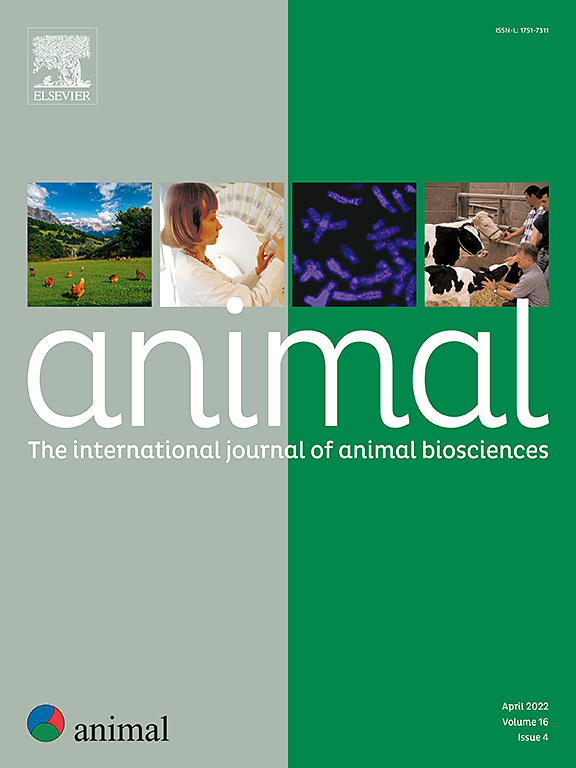Applying recursive modelling to assess the role of the host genome and the gut microbiome on feed efficiency in pigs
IF 4
2区 农林科学
Q1 AGRICULTURE, DAIRY & ANIMAL SCIENCE
引用次数: 0
Abstract
The gut microbiome plays an important role in the performance and health of swine by providing essential nutrients and supporting the immune system. Recent studies have demonstrated that the gut microbiome can explain part of the variation observed in growth, health, and meat quality. Feed efficiency is crucial in swine production, as feed cost account for more than 60% of total production costs. This study aimed to assess the relationships between the host genome, gut microbiome, and feed efficiency in Iberian pigs raised under intensive conditions. The specific objectives were to assess the mediating effects of the gut microbiome on feed efficiency and to estimate the direct and total heritability of feed efficiency. The data set included the feed conversion ratio (FCR) and residual feed intake (RFI) from 587 Iberian pigs, as well as the 16S rRNA gut microbial abundance from 151 of those pigs raised in a nucleus of selection. We reparametrised variance components from standard bivariate mixed models into recursive models to disentangle the microbiome’s mediating effect on feed efficiency. In our models, the host genome has direct effects on both the phenotype (G→P) and the gut microbiome (G→M). Additionally, there is an indirect effect of the host genome on the phenotype mediated by the microbiome (G→M→P). We identified a total of 14 taxa with relevant effects on FCR and 16 taxa with relevant effects on RFI. We categorised the gut microbiome into groups for potential practical application in pig farming. The gut microbes with relevant causal effects and low heritability can be manipulated through management interventions, while those microbes with relevant causal effects and moderate heritability can be targeted through selective breeding. Our findings indicate that incorporating microbiome data leads to a reduction in total heritability for both FCR and RFI. This study provides new insights into the link between the gut microbiome and feed efficiency, presenting practical methods to target microbes that can be influenced through selective breeding or management interventions.
求助全文
约1分钟内获得全文
求助全文
来源期刊

Animal
农林科学-奶制品与动物科学
CiteScore
7.50
自引率
2.80%
发文量
246
审稿时长
3 months
期刊介绍:
Editorial board
animal attracts the best research in animal biology and animal systems from across the spectrum of the agricultural, biomedical, and environmental sciences. It is the central element in an exciting collaboration between the British Society of Animal Science (BSAS), Institut National de la Recherche Agronomique (INRA) and the European Federation of Animal Science (EAAP) and represents a merging of three scientific journals: Animal Science; Animal Research; Reproduction, Nutrition, Development. animal publishes original cutting-edge research, ''hot'' topics and horizon-scanning reviews on animal-related aspects of the life sciences at the molecular, cellular, organ, whole animal and production system levels. The main subject areas include: breeding and genetics; nutrition; physiology and functional biology of systems; behaviour, health and welfare; farming systems, environmental impact and climate change; product quality, human health and well-being. Animal models and papers dealing with the integration of research between these topics and their impact on the environment and people are particularly welcome.
 求助内容:
求助内容: 应助结果提醒方式:
应助结果提醒方式:


